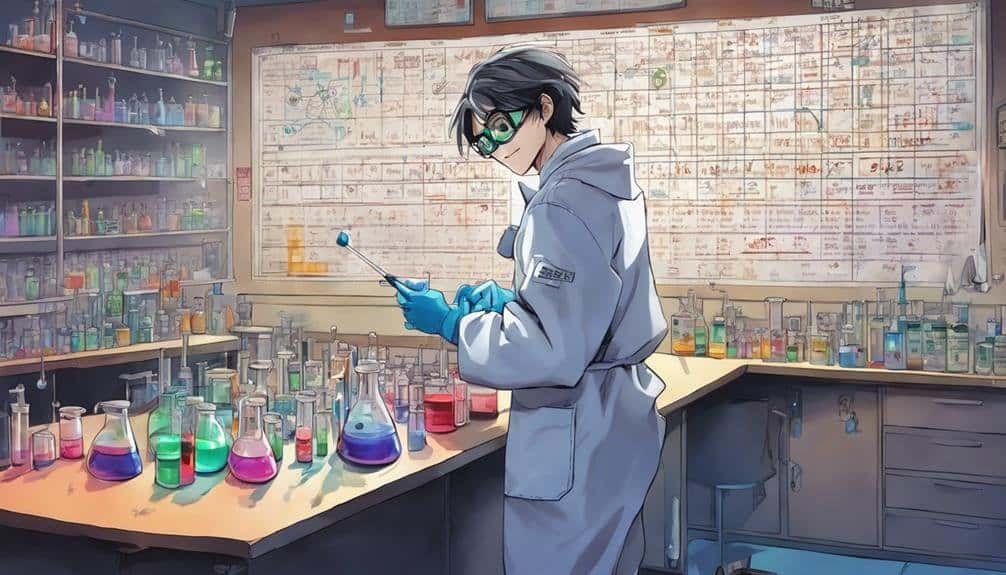Job Duties for Chemical Engineer
In the domain of chemical engineering, the spectrum of responsibilities extends far beyond the confines of laboratories and theoretical models. From designing intricate production processes to ensuring adherence to stringent safety protocols, the duties of a chemical engineer are as diverse as they are essential.
However, there is one particular aspect of their role that often goes unnoticed, yet plays a pivotal role in the success of their endeavors. This often-overlooked facet not only demands a keen eye for detail but also requires a strategic mindset to navigate the complexities of modern industrial landscapes.
Key Takeaways
- Conduct research using various methodologies for technology advancement.
- Design production processes for peak efficiency and safety.
- Implement safety protocols and ensure regulatory compliance.
- Foster innovation through collaboration and troubleshooting for progress.
Conducting Research and Analysis
In the domain of chemical engineering, one of the primary responsibilities entails systematically conducting research and analysis to drive innovation and problem-solving within the field. Research methodology serves as the cornerstone of this process, guiding engineers in designing experiments, collecting data, and drawing meaningful conclusions. Chemical engineers employ various research methodologies, including experimental studies, simulations, and literature reviews, to expand scientific knowledge and develop practical solutions to industry challenges.
Data analysis plays a vital role in the research phase, where chemical engineers utilize statistical tools and software to interpret experimental results and validate hypotheses. By meticulously analyzing data, engineers can identify trends, correlations, and anomalies that inform their decision-making process. This analytical approach guarantees that conclusions drawn from research are sound and reliable, laying the groundwork for further exploration or application in real-world scenarios.
In essence, the meticulous application of research methodology and data analysis enables chemical engineers to push the boundaries of knowledge, foster innovation, and address complex problems within the domain of chemical engineering.
Designing Production Processes
In the domain of chemical engineering, the design of production processes encompasses critical aspects such as process optimization techniques and the implementation of safety measures. Engineers must meticulously analyze and refine production methods to enhance efficiency and mitigate risks within industrial settings.
Process Optimization Techniques
Utilizing innovative strategies and advanced methodologies, chemical engineers meticulously craft production processes to achieve peak efficiency through process optimization techniques. Energy conservation strategies play a pivotal role in minimizing resource consumption and reducing environmental impact. Chemical engineers analyze and implement energy-saving methods such as heat integration, process intensification, and renewable energy utilization to enhance overall process sustainability.
Additionally, equipment reliability optimization is essential for ensuring smooth operations and preventing costly downtimes. Through predictive maintenance, condition monitoring, and failure analysis, engineers can proactively identify and address potential equipment issues, ultimately maximizing production output.
Safety Measures Implementation
Employing a meticulous approach to process design, chemical engineers prioritize the integration of safety measures to guarantee the protection of personnel and the environment throughout production processes. Safety audits and risk assessments are conducted regularly to identify and mitigate potential hazards. Chemical engineers make certain that emergency response training is provided to all personnel working with hazardous chemicals, enabling swift and effective action in case of an incident. By incorporating safety measures into the design of production processes, they create a secure working environment that complies with regulatory standards and industry best practices.
| Safety Audits | Risk Assessments | Emergency Response Training | Hazardous Chemicals |
|---|---|---|---|
| Regular checks | Identification of risks | Training programs | Handling protocols |
Ensuring Efficiency and Safety
Ensuring efficiency and safety in chemical engineering involves the meticulous implementation of safety protocols to safeguard personnel and the environment. Adhering to stringent efficiency standards optimizes production processes, while incorporating preventive measures mitigates potential hazards in the workplace.
These key aspects form the foundation of a chemical engineer's role in maintaining a safe and productive working environment. Upholding industry regulations and best practices for operational excellence is essential.
Safety Protocols Implementation
With a core focus on maintaining operational efficiency and ensuring the highest level of safety, chemical engineers play a critical role in the implementation of safety protocols within various industrial settings. This involves conducting safety audits and risk assessments to identify potential hazards, developing emergency response plans, and ensuring effective hazard communication to all personnel. Below is a table summarizing key aspects of safety protocols implementation:
| Safety Protocols Implementation |
|---|
| Conducting safety audits |
| Performing risk assessments |
| Developing emergency response plans |
| Ensuring hazard communication |
| Implementing safety protocols |
Efficiency Standards Adherence
To optimize operational performance while prioritizing safety, chemical engineers rigorously adhere to efficiency standards in their processes. They focus on energy efficiency and guarantee cost effectiveness to make certain that operations are conducted in the most resource-effective manner.
By maintaining regulatory compliance, chemical engineers guarantee that all processes meet legal requirements and industry standards. This adherence not only fosters sustainability within the organization but also contributes to environmental protection.
Chemical engineers continuously assess and improve processes to enhance efficiency while controlling costs and minimizing waste. Their commitment to efficiency standards not only drives operational excellence but also underscores their dedication to creating sustainable and safe practices within the chemical engineering field.
Hazard Prevention Measures
Chemical engineers implement meticulous hazard prevention measures to guarantee both efficiency and safety in their processes. They conduct thorough risk assessments to identify potential hazards and develop protocols to mitigate risks effectively.
Emergency response plans are carefully crafted to make sure swift and coordinated actions in case of unexpected events. Engineers also focus on minimizing chemical exposure by implementing engineering controls, personal protective equipment, and proper ventilation systems.
Regular monitoring and maintenance of equipment are important to prevent accidents and maintain a safe working environment. By adhering to strict safety protocols and staying informed about the latest industry standards, chemical engineers play an essential role in safeguarding both the workforce and the surrounding environment.
Developing New Technologies
In the domain of chemical engineering, the process of developing new technologies requires a meticulous approach that integrates innovation with scientific rigor. To excel in this aspect, chemical engineers employ various strategies and practices to guarantee the creation of cutting-edge solutions that are both effective and sustainable. Here are three key elements vital in the development of new technologies:
- Innovation Strategies: Chemical engineers leverage innovation strategies such as design thinking and continuous improvement methodologies to foster creativity and drive novel technological advancements. By thinking outside the box and exploring unconventional approaches, they can push the boundaries of what is possible in the field of chemical engineering.
- Sustainability Practices: A core focus of modern chemical engineering is sustainability. Engineers prioritize sustainability practices like green chemistry principles, waste minimization, and energy efficiency enhancements when developing new technologies. By integrating sustainable practices from the outset, they guarantee that the technologies created are environmentally friendly and contribute positively to society.
- Research and Development: Rigorous research and development processes underpin the creation of new technologies in chemical engineering. Engineers conduct thorough experiments, analyze data meticulously, and iterate on designs to optimize the performance and effectiveness of new technological solutions. This systematic approach is essential for achieving breakthroughs in the field and driving innovation forward.
Collaborating With Teams
Collaboration with interdisciplinary teams is paramount in ensuring the successful implementation and deployment of new technological advancements in the field of chemical engineering. Team dynamics play a critical role in leveraging the diverse expertise of individuals towards a common goal. Chemical engineers often work alongside professionals from various disciplines such as chemistry, mechanical engineering, and material science. Understanding each team member's strengths and how they contribute to the project is essential for effective problem-solving and innovation.
Effective communication is key in interdisciplinary collaborations. Chemical engineers must convey complex technical concepts in a clear and concise manner to team members with different backgrounds. Moreover, strong project management skills are necessary to coordinate tasks, set timelines, and ensure milestones are met. By fostering open communication channels and utilizing project management techniques, teams can navigate challenges efficiently and drive projects towards successful outcomes.
Troubleshooting Production Issues
When encountering production issues, chemical engineers employ systematic problem-solving approaches to identify root causes and implement effective solutions. This process involves a combination of technical expertise, analytical thinking, and practical skills to guarantee the smooth operation of chemical processes.
Key responsibilities in troubleshooting production issues include:
- Root Cause Analysis: Chemical engineers conduct in-depth analyses to determine the underlying reasons for production issues. By identifying the root cause of a problem, engineers can develop targeted solutions that prevent recurrence and improve overall process efficiency.
- Process Improvement: After identifying the root cause, chemical engineers work on implementing process improvements to enhance productivity, quality, and safety. This may involve redesigning processes, optimizing operating conditions, or introducing new technologies to address production challenges effectively.
- Equipment Troubleshooting & Data Analysis: Chemical engineers troubleshoot equipment malfunctions to maintain operational continuity. They utilize data analysis techniques to monitor equipment performance, identify deviations from standard parameters, and take proactive measures to prevent downtime and guarantee seamless production processes.
Monitoring Quality Control
For chemical engineers, monitoring quality control is a critical function that guarantees adherence to standards and consistency in product specifications. This process involves meticulous attention to detail and a systematic approach to ensuring that products meet required quality benchmarks.
In monitoring quality control, chemical engineers are responsible for equipment maintenance to guarantee accurate measurements and reliable performance. They conduct thorough data analysis to identify any deviations from set standards promptly. Additionally, regulatory compliance is a key aspect of this role, requiring engineers to stay informed about industry regulations and implement necessary changes to meet them.
Additionally, process automation plays a significant role in enhancing quality control monitoring efficiency. By utilizing automation technologies, chemical engineers can streamline processes, reduce human error, and improve overall product quality. Ensuring that quality control procedures are robust and consistently applied is essential for maintaining high-quality standards in chemical engineering processes.
Implementing Environmental Regulations
In aligning with regulatory compliance responsibilities, chemical engineers undertake the important task of implementing environmental regulations to guarantee sustainable practices within their processes. This involves several key aspects:
- Environmental Impact Assessment: Chemical engineers conduct thorough environmental impact assessments to understand the potential effects of their processes on the environment. By evaluating factors such as emissions, waste generation, and resource consumption, they can identify areas for improvement to minimize negative impacts.
- Compliance: Ensuring compliance with environmental regulations is paramount. Chemical engineers stay up-to-date with the latest laws and guidelines related to environmental protection. They implement measures to meet these requirements and prevent any violations that could result in penalties or harm to the environment.
- Sustainability Initiatives Implementation: Chemical engineers drive sustainability initiatives within their organizations by implementing eco-friendly practices, optimizing resource usage, and exploring alternative technologies. By integrating sustainability into their processes, they contribute to long-term environmental protection and responsible industrial practices.
Continuous Process Improvement
The optimization of operational procedures and methodologies remains a core focus for chemical engineers in achieving Continuous Process Improvement. Process efficiency is a key element in this endeavor, requiring chemical engineers to continually assess and enhance the efficiency of production processes. By analyzing data, identifying bottlenecks, and implementing solutions, engineers can streamline operations and maximize output quality while minimizing resource consumption.
Innovation strategies play an essential role in driving Continuous Process Improvement. Chemical engineers are tasked with exploring new technologies, materials, and techniques to enhance process efficiency and sustainability. This may involve researching cutting-edge methodologies, collaborating with cross-functional teams, and staying abreast of industry advancements. By embracing innovation, chemical engineers can proactively identify areas for improvement and implement solutions that elevate overall operational performance.
Continuous Process Improvement is not a one-time task but a continuous cycle of assessment, implementation, and evaluation. Chemical engineers play a pivotal role in this process, using their expertise to refine processes, optimize workflows, and drive ongoing enhancements in operational efficiency and effectiveness.
Conclusion
To sum up, the role of a chemical engineer is akin to a skilled conductor orchestrating a complex symphony of research, design, safety, and innovation.
By collaborating with teams, troubleshooting issues, and ensuring efficiency, chemical engineers play a pivotal role in the production process.
With a focus on continuous improvement and adherence to environmental regulations, they aim to create a harmonious blend of technology and sustainability in their work.







